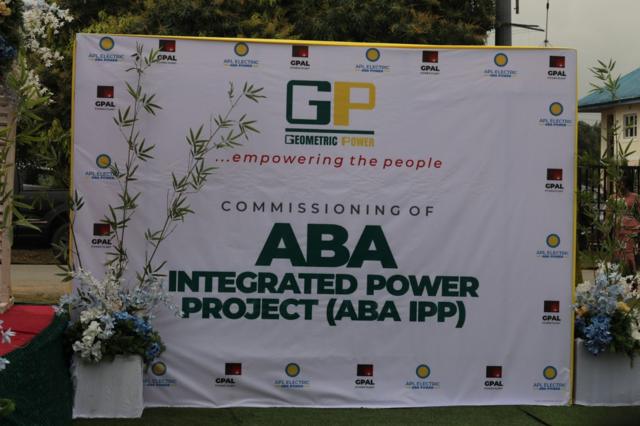
BY FRED EDOREH
It is interesting, in fact, amusing, to see the plaudits following the realisation of the Aba IPP delivered through the partnership of Prof Barth Nnaji’s Geometric Power company and Dr Alex Otti, Governor of Abia State.
The biggest irony for me is in hearing the Federal Government challenge other state governors to emulate the Abia example.
To be clear, I am a stickler for holding leaders accountable and pushing them to take giant and decisive initiatives towards advancing our development, but I frown at half-truths and single stories, especially as usually contained in the oft propaganda of the Federal Government to blame national failure away from itself and blackmail state governments as the main culprit, as has been the pattern in the history of our underdevelopment.
For several decades, the FG held a monopoly of critical sectors – electricity, telecommunications, Petroleum refining, aviation, shipping, railways, security etc, all of which they bungled.
It was therefore welcome to see the Olusegun Obasanjo administration launch the privatisation programme and the accompanying unbundling of various critical sectors.
Part of it was the Power Sector Reform. After Prof Nnaji had served as Minister of Science and Technology in 1993 and returned to the United States, Obasanjo brought him back to serve as Special Adviser in the process.
In the early to mid-2000s, Nnaji demonstrated his ability by championing the 22MW off-grid plant that provided 24/7 power supply to Abuja Central Business District, the Federal Secretariat, the NNPC hq and several other strategic institutions.
With this success, he initiated the Aba IPP in 2010, also to be off-grid. Calculated to support the industrial culture of the city and its environs, it was scheduled to commence commercial electricity service in 2014.
The Federal Government and PHCN approved the project and, indeed, entered into an agreement on gas supply from the Shell Gas Collection centre in Aba, the construction of about 27km pipeline to deliver gas to the plant, and the right to independent transmission, distribution and commercial operation, among other terms.
Partnering with General Electric USA and other global big players in the industry from the UK, Germany, Belgium and South Africa, he invested about 500 million dollars on the project.
Part of the investment was made possible by Alex Otti who, working then as Executive Director at First Bank, facilitated the approval of about $85m loan for the project.
Almost immediately after,
Otti left First Bank for Diamond Bank and, curiously, First Bank allegedly became lethargic about the project.
Nnaji went back to Otti who further facilitated an arrangement with Diamond Bank to support the project.
However, as proceedings went on, Geometric seemed to experience a shift in the attitude of the Federal Govt and the PHCN towards the project. The indication was that the FG reneged on the various terms to ring-fence the project and it was consequently abandoned or kept on hold.
One can only imagine what trauma Nnaji would have gone through, having committed such a huge investment and experiencing the political somersaults that followed.
Alex Otti on his part had left the bank for politics in which his several efforts to emerge the Governor of Abia State had also met with INEC and judiciary challenges, until his last and successful attempt in 2023.
Flashback: Knowing his expertise, Nnaji was, in 2011, appointed Minister of Power and Energy under President Goodluck Jonathan. We, as laymen, may not know what he did, but there seemed to have been a general acknowledgement that the electricity supply was improving under his ministration.
But, as Fela will put it, “suddenly, suddenly,” he resigned under controversial circumstances. It was alleged that he tried to use his influence as Minister to favour his Geometric Power in the privatisation of Afam Power Plant. He denied it, even as he testified repeatedly that he had disclosed his interest in Geometric Power to the Federal Executive Council.
The National Union of Electricity Employees, a member of the labour union, also raised various spurious allegations of financial impropriety against him, but after he left those allegations were no longer pursued to prosecution.
Their main grouse also, was that he approved 25 percent payment for pension and gratuity as against what they have been used to since 1972.
It would be recalled that the same labour union was against the privatisation or concession of the Kaduna Refinery to Dangote, in the name of protecting workers’ rights.
That led Dangote unto the path of establishing his private refinery which now has come into effect while the Kaduna Refinery is still as it was.
Back to Nnaji. It was later realised that his forced resignation as Minister was because of his position in the selection of electricity distribution companies, DISCOS.
While he was said to have insisted that the prospective companies must show proof of technical and financial capacity, the big goons wanted the pie for themselves and Nnaji’s conditions and continued stay in the supervision of the process was inimical to their interest. Meanwhile, Jonathan was contemplating a second tenure in 2015 and would need the buy-in of the goons.
So, Nnaji resigned and the strong men got the DISCOS they wanted. But, today, even the current Minister of Power and Energy has submitted that one of the weakest links in Nigeria’s electricity crisis is the DISCOS, lacking in both technical and financial capacity to adequately deliver to their allocated coverage areas.
It is also an interesting statement of fate that, after all that Nnaji had gone through, providence brought him back together with Otti as the State Governor of the project area, and he is also now a free man, independent and unencumbered by recklessly unprioritised high-wire politics, to revive and realise the Aba IPP, the biggest and first completely autonomous off-grid power plant in the country.
It is also a telling irony that the Federal Government which constrained and frustrated the project in several ways for several years is now celebrating its completion.
How on earth did we come to force such a person whom we now celebrate as an excellent power sector entrepreneur to resign as our Minister of Power? Isn’t it a shame that we are now celebrating his baby as the ultimate example? “Hello baby, are you okay?”
In the FG’s challenge to other state governors to do what Abia State has done, we should not forget that the project took a whole 20-something years to accomplish. Not because it couldn’t have been completed in far less time, but because of the vagaries which the FG itself inflicts, through its monopolistic control, bad politics and policy uncertainties, on critical private sector initiatives and investments for the development of our nation.
We can recall the former Governor of Lagos State, Babatunde Fashola, who declared during his campaign for Buhari’s Presidency that, any government that cannot fix power in six months is not worthy.
Alas, they came into power and he was subsequently appointed Minister of Power, together with Works and Housing, and for the eight years of Buhari’s administration and his ministration over the power sector, the electricity supply he so vaunted about only got worse.
We also can recall how the Obasanjo regime was said to have invested about $15 billion in the power sector and how we not only did not see the light but could not reasonably account for the money nor were we allowed to ask questions.
It has been so because, even as they said they were unbundling and reforming the power sector, it still remained in the Exclusive Legislative List of the Federal Government.
The situation has also been the same with Federal roads, also in the Exclusive Legislative List, and for which the FG gets huge allocations, but while it failed to substantially maintain the roads, it had been able, through propaganda, to push the people away from holding it responsible and accountable, and confused them into blaming the state governors.
This is even when the FG itself had declared, during the Buhari regime, that not only would state governments not get refunds for intervention on federal roads, but that they are unauthorized to intervene.
Thankfully, the Tinubu administration has altered that monopoly, especially in the power sector, by bringing it to the Concurrent Legislative List. That now allows states, and even local governments, to independently address their mind to the electricity crisis in their respective constituencies and fully control their investments and processes towards providing solutions.
This is what gave vent to the continuation and accomplishment of the Aba IPP. Its quick completion is only a fait accompli, given the fact that it had been under construction long before now and even more also because Otti, now as Governor, had been part of the project, from the private sector, for over 20 years.
I have gone into this long history of our underdevelopment, especially of the power sector so that we can understand the underlying issues: why, where, when and how the rain started beating us, and not always fall for the blackmail of the FG against state governments.
It had always been a programmed failure for states to invest in highly expensive independent power generation while the transmission and distribution remained in the dictates and control of the FG under an inefficient NEPA or PHCN and one omnibus “National Grid.”
I have always argued against the so-called “National Grid” because I have seen in advanced countries how municipalities, states and provinces undertake their electricity supply through multiple systems – hydro, solar, gas, wind, organic wastes, etc – according to their comparative advantages.
However, it is indeed a new dispensation now. States must now take the responsibility for power. No excuses any more.
Yet, we must also understand that, unlike Aba and Geometric, it will take them some time to achieve. This is because power plants are not purchased off the shelf. They are constructed by order. It will take an assemblage of technical partners in generation, transmission, distribution, even marketing and collection, as well as willing investors with financial capability to achieve our dream.
Still, the onus now is on state Governors: “Let there be light…”








